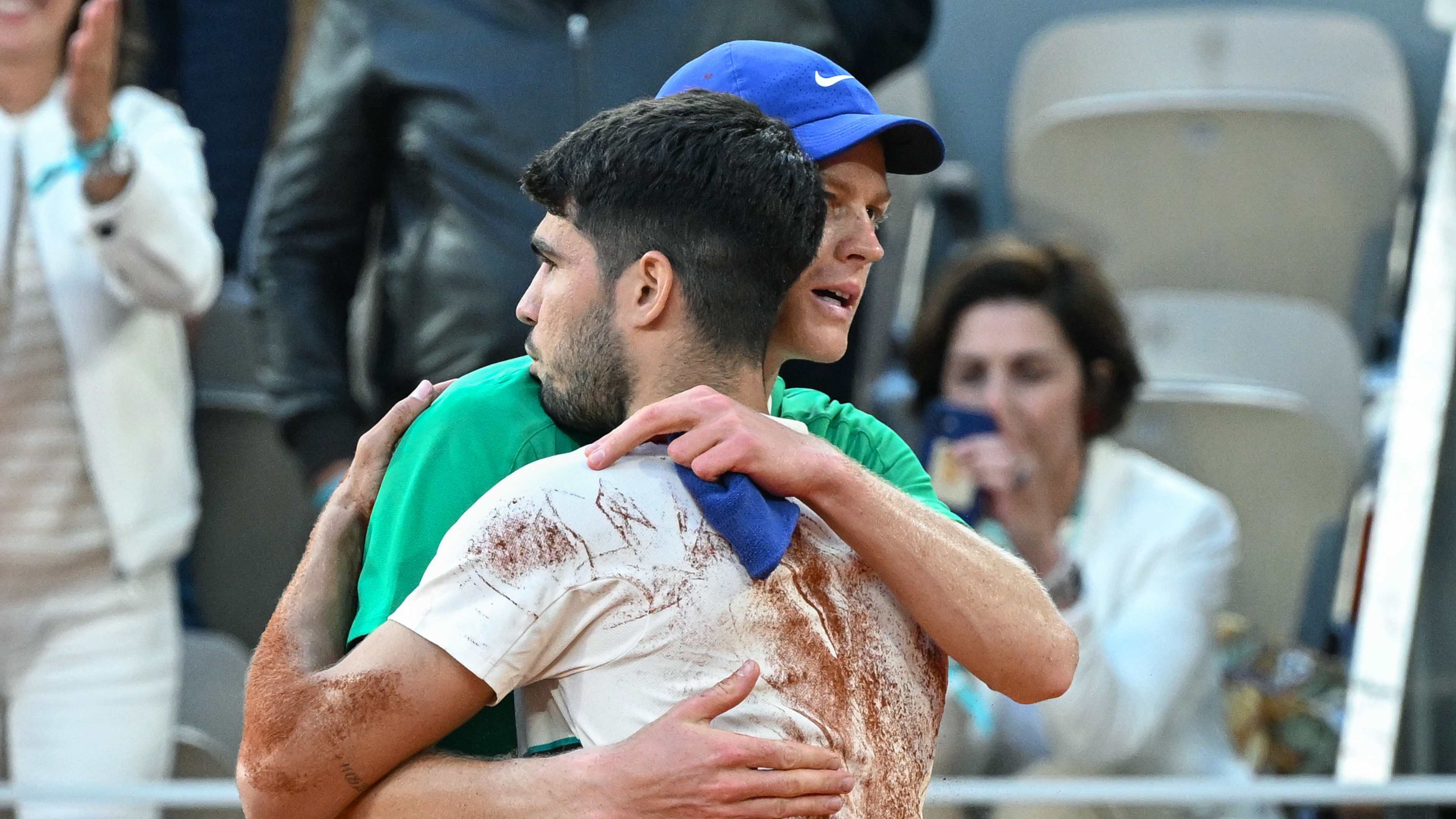Two weeks ago, Rafael Nadal waved good-bye to Roland Garros, and to tennis.
Two days ago, Novak Djokovic walked off with a handful of clay from Court Philippe Chatrier, and said he may never be back.
Finally, on Sunday, the fortnight ended with their young successors, Carlos Alcaraz and Jannik Sinner, playing their first Grand Slam final, and turning it into the match of the decade, and maybe the century.
It seems safe to say that the men’s-tennis torch has, at long last, been passed. It seems equally safe to say that Alcaraz, 22, and Sinner, 23, are ready to run with it. Their rivalry is just getting started, but if Sunday’s epic is any indication, they’ll be taking tennis fans to places we’ve never been before.
Alcaraz’s took 5 hours and 29 minutes, making it the longest final in Roland Garros history. Between them, they hit 1,433 ground strokes. Sinner, the loser, won 193 points; Alcaraz, the winner, won 192. Each broke serve seven times. And each staged one improbable comeback. It ended, after all of that, with Alcaraz raising his game to a place where even Sinner couldn’t go.
Alcaraz’s took 5 hours and 29 minutes, making it the longest final in Roland Garros history. Between them, they hit 1,433 ground strokes. Sinner, the loser, won 193 points; Alcaraz, the winner, won 192. Each broke serve seven times. And each staged one improbable comeback. It ended, after all of that, with Alcaraz raising his game to a place where even Sinner couldn’t go.
“Today there were a few moments of the match that, I mean, the level was insane,” Alcaraz said.
For the majority of the first four sets, though, this looked less like a classic than the coronation of a new multi-surface ATP king. And that king wasn’t going to be Alcaraz.
Late in the first set, the Spaniard got clay in his eye. While his vision quickly returned, his game didn’t. Sinner raced to a 6-4, 4-1 lead. His serve, his return, his forehand to both corners: They were all sharp. At the same time, Alcaraz was adrift. He chattered angrily with his coaches, unable to land on a successful tactic.
“His head’s gone a bit AWOL here,” John McEnroe said in the TNT booth.
Even when Alcaraz broke Sinner back at 5-3 and forced a tiebreaker, he couldn’t capitalize. The set ended with the Spaniard belting a forehand crosscourt, only to see Sinner stretch wide and snap back an even better forehand, at a sharper angle, to win the point.
Sinner had blinked, but he had recovered. He had now won 20 straight sets at RG, and needed just one more. After he broke to start the third, it felt like he had a clear path to No. 21. Alcaraz felt the same way.
“When he broke my serve at the beginning of the third set, I felt like everything was to his favor,” Alcaraz said. “I felt like everything he’s doing was going to be in.”
Sometimes glimpsing the finish line will make a player feel more confident. Just as often, it can bring an onset of nerves. Sinner really only made one mistake: Serving at 1-0, up 40-30, he hit a forehand that landed just wide. It was out by an inch, but that was all the defending champion needed. Alcaraz broke, then broke for the set at 5-4. The crowd, which had been waiting for him to come to life, erupted.
Sometimes glimpsing the finish line will make a player feel more confident. Just as often, it can bring an onset of nerves. Sinner really only made one mistake: Serving at 1-0, up 40-30, he hit a forehand that landed just wide. It was out by an inch, but that was all the defending champion needed. Alcaraz broke, then broke for the set at 5-4. The crowd, which had been waiting for him to come to life, erupted.
Sinner had blinked again, but again he quickly recovered. Just as Alcaraz looked ready to start a comeback, Sinner stole the initiative by going on the attack. At 3-3 in the fourth, he broke Alcaraz at love with a mix of drop shots and ground-stroke pressure. Two games later, with Alcaraz serving at 3-5, Sinner went up 0-40, triple championship point.
Now it was Alcaraz’s turn to bend, but not break, and find his best when he had to have it. Alcaraz cut out the errors that had been plaguing him, and made Sinner beat him. Sinner couldn’t do it. He missed two forehands and a backhand on his match points, and Alcaraz held. From there, the Spaniard, freed from jail, rampaged through a fourth-set tiebreaker, and went up an early break in the fifth.
“I just believe all the time,” Alcaraz said. “I never have doubt about myself, even though in those match points down. I thought just one point at a time.”
There was no way he could lose now, right? No way that Sinner, after those match points, had the physical or mental strength to mount a comeback.
There was no way he could lose now, right? No way that Sinner, after those match points, had the physical or mental strength to mount a comeback.
It didn’t look that way for the first nine games of the fifth, but when Alcaraz served for the match at 5-4, the tables suddenly turned. Now the Spaniard was tight, and the Italian was loose. He went on the attack again, won a point with a seemingly impossible get and winning re-drop, broke for 5-5 and held for 6-5. Considering when it happened, and the gargantuan mental effort it required, it may have been Sinner’s most impressive run of the day.
“I tried to delete everything, every set,” Sinner said. “In Grand Slams you try to start from zero again. I was of course disappointed about the fourth set and match points and serving for the match. But again, I stayed there mentally.”
Sadly for Sinner, his finest moment would just be a prelude to an even better one for Alcaraz.
Down 5-6 in the fifth, Alcaraz fell behind 15-30 when Sinner played an immaculate half-volley from behind his body. On the next point, Sinner fired what looked to be a winning crosscourt forehand, which would have given him two more match points. Somehow, though, Alcaraz—still bending but not breaking—tracked it down and sliced a forehand that landed on the sideline.
Down 5-6 in the fifth, Alcaraz fell behind 15-30 when Sinner played an immaculate half-volley from behind his body. On the next point, Sinner fired what looked to be a winning crosscourt forehand, which would have given him two more match points. Somehow, though, Alcaraz—still bending but not breaking—tracked it down and sliced a forehand that landed on the sideline.
Winning that point sent Alcaraz on his final rampage of the day. He hit a backhand pass to hold for 6-6, then won the first seven points of the deciding tiebreaker. Every shot was better than the last, and every roar sounded louder. He hit a forehand winner, a swing-volley winner, a backhand winner on the sideline, a service winner, and, finally, a running forehand pass for the title.







